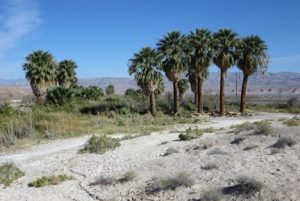NAU professor a collaborator on research, published in a special-edition journal, addressing need for conservation of springs in drying climate
By Northern Arizona University
6/2/2020

Springs have served as refuges for some species through previous climatic changes, and that’s likely to become even more true in the future.
Photo credit: J Bailard, NPS
A Northern Arizona University professor co-authored a paper on the importance of springs in a drying climate that is in the inaugural climate change refugia special edition of Frontiers in Ecology and the Environment.
The issue focuses on refugia, which refers to areas that are relatively buffered from current climate change and shelter valued wildlife, ecosystems and other natural resources. Abe Springer, a professor of hydrogeology and ecohydrology in the School of Earth and Sustainability whose research focuses on springs and aquifer health, collaborated on “Oases of the future? Springs as potential hydrological refugia in drying climates.”
The collaborators, which included the U.S. Geological Survey, Rocky Mountain Research Station, the U.S. Department of Agriculture, the Nature Conservancy, Sky Island Alliance, Hampshire College, the Museum of Northern Arizona and National Park Service and Glen Canyon National Recreation Area, reviewed relevant published studies on the role of springs as refuges to support plants and animals in drying climates. They created a conceptual model that takes into account the response of springs to drying events and what investigations researchers must do to identify and classify a spring’s potential to be a refuge.
Read more here: http://news.nau.edu/springer-climate-change-refugia/#.Xtk6rhNKjOQ
Read more in Frontiers in Ecology and the Environment: https://esajournals.onlinelibrary.wiley.com/doi/full/10.1002/fee.2191